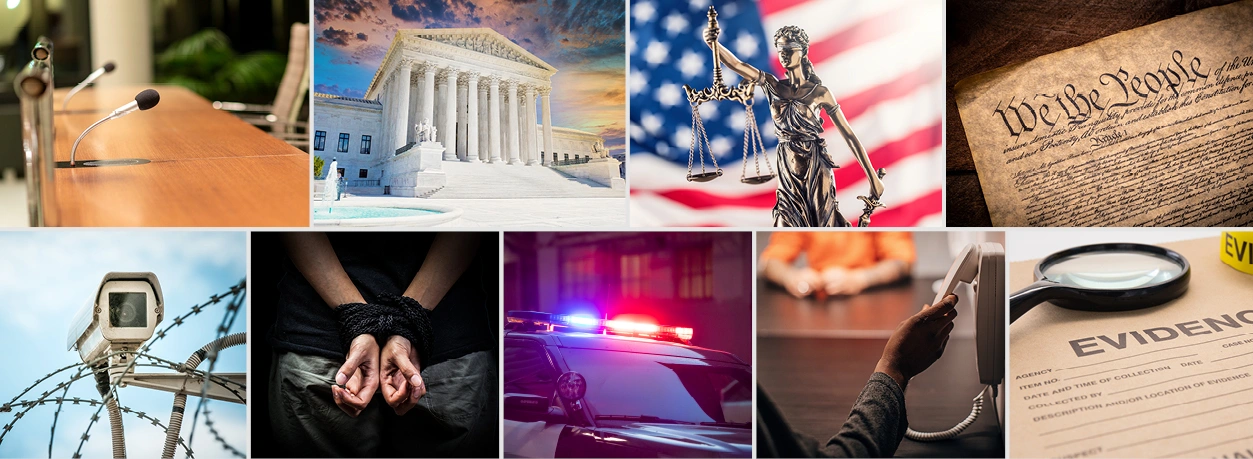
FAIRNESS AND EQUALITY FOR ALL
McGuireWoods’ Appellate Justice Initiative includes dozens of volunteer lawyers, paralegals and business professionals dedicated to protecting the rights of criminal defendants and effecting real change in the criminal justice arena.
Working closely with the firm’s pro bono team, we make a difference by identifying and challenging at the appellate level practices that infringe on the constitutional rights of defendants — especially those affected by racial disparities in the criminal justice system.
For questions about McGuireWoods’ Appellate Justice Initiative, email [email protected].

REAL-LIFE IMPACT
NEW HEARING FOR MENTALLY ILL INMATE
McGuireWoods won a new hearing for a mentally ill inmate in Virginia who filed a federal habeas petition seeking to have his 2007 murder conviction vacated. The 4th Circuit’s Aug. 15, 2023, opinion entitles Berman Justus Jr. to an evidentiary hearing to determine whether his mental illness constitutes an “extraordinary circumstance” that justifies relief from the statute of limitations governing his habeas petition.
APPLICATION OF THE FIRST STEP ACT OF 2018
McGuireWoods represents a federal prisoner serving a life sentence for a nonviolent drug offense. The statutory scheme under which the prisoner was sentenced frequently resulted in unjustified disparities between sentences for powder and crack cocaine. The district court denied our client’s motion for a reduced sentence under the First Step Act of 2018, which Congress enacted to address such disparities. The issue before the 4th Circuit is whether, when considering the defendant’s First Step motion, the district court was required to account for legal developments favorable to the defendant that occurred after he was originally sentenced in 1994.
ENHANCEMENT FOR PRIOR “SERIOUS DRUG FELONY” CONVICTION
In another case involving the First Step Act, McGuireWoods, in partnership with the Federal Defender’s Office, represents the appellant who is appealing his conviction and sentence. After the appellant was indicted for several drug offenses, the district judge ruled that a sentencing enhancement under the First Step Act — for prior conviction of a “serious drug felony” — applied to increase the statutory minimum term from 10 to 15 years. At issue before the 4th Circuit is whether the district court erred in determining that the appellant had a prior “serious drug felony” conviction without submitting to the jury factual issues necessary to that finding.
DEFENDING INDIGENT INMATE’S SPEEDY TRIAL RIGHTS
A North Carolina prison’s restrictive mail policy prevented an indigent inmate from sending documents to invoke his right to a speedy trial on charges he faced in another county, forcing him to plead guilty. On June 25, 2021, McGuireWoods asked the 4th U.S. Circuit Court of Appeals to find that the prison’s policies violated our client’s rights under the First Amendment.
MAJOR AEDPA WIN IN FEDERAL HABEAS CASE
In 2020, McGuireWoods won a significant victory in the 4th Circuit on behalf of a West Virginia prisoner who challenged his life sentence based on his prior attorney’s alleged ineffective assistance in advising against accepting a plea agreement. The 4th Circuit ordered the state to re-offer the plea deal — a major win because state prisoners rarely satisfy the Antiterrorism and Effective Death Penalty Act’s criteria in federal habeas litigation.
AUTOMATIC LICENSE SUSPENSIONS END FOR FAILURE TO PAY COURT FEES
In 2019, McGuireWoods and McGuireWoods Consulting joined the Legal Aid Justice Center to lead — and win — the fight to end Virginia’s unconstitutional practice of automatically suspending driver’s licenses for failure to pay court fines and costs.
ISSUE OF FIRST IMPRESSION REGARDING ACCESS TO PRISON VIDEO
McGuireWoods won a precedent-setting 4th Circuit appeal for a client who lost “good time credits” when charged in prison disciplinary proceedings. In the 2019 opinion, the court said federal inmates have a due process right to access and compel official consideration of video surveillance evidence in prison disciplinary proceedings and such evidence should be withheld only if hazardous to institutional safety or correctional goals.
LARGEST SINGLE-PLAINTIFF HUMAN TRAFFICKING AWARD IN U.S. HISTORY
In 2018, McGuireWoods won nearly $8 million in damages for a human trafficking survivor in a federal suit against a “regimented cult” and the group’s leader, who forced our client to work since she was a child without pay, benefits or breaks for a decade. We prevailed in this federal civil suit for our pro bono client and the court’s decision now serves as a model in this developing area of law.
FOURTH AMENDMENT WIN FOR PRO BONO CLIENT AT U.S. SUPREME COURT
The U.S. Supreme Court sided with McGuireWoods’ client and ruled decisively that police officers without a warrant cannot use the automobile exception to enter a home’s curtilage to access a vehicle. The 2018 ruling, which provided needed clarity to the scope of the automobile exception, became part of police training across the country, and the case stands as a major bulwark protecting the sanctity of the home from creeping exceptions.
DEATH SENTENCE CHANGED TO LIFE IN PRISON FOR TEXAS INMATE
In 2016, McGuireWoods successfully persuaded the Texas Court of Criminal Appeals to change a client’s death sentence to life in prison, affirming a trial court ruling that the defendant is intellectually disabled and constitutionally ineligible for the death penalty.
ENSURED VIRGINIA COURTS MUST CONSIDER SUPPRESSED EVIDENCE
A Virginia inmate learned of suppressed evidence that could potentially exonerate him of a murder conviction, but the state’s statute of limitations prevented the court from considering the evidence. McGuireWoods appealed to the Virginia Supreme Court, which ruled in 2015 that state courts must consider illegally suppressed exculpatory evidence regardless of when it is discovered.
CLARIFYING THE RIGHT TO CROSS-EXAMINE ACCOMPLICES
In a case with nationwide implications, McGuireWoods asked the U.S. Supreme Court to clarify the scope of a defendant’s rights under the Confrontation Clause. Convicted of drug offenses in federal court based on the testimony of four alleged accomplices, our client was not allowed to cross-examine these witnesses about the magnitude of the sentencing benefit they received from the prosecution for their testimony. Similar restrictions are allowed in courts around the country. On June 21, 2021, McGuireWoods filed a petition for a writ of certiorari asking the high court to clarify that the Confrontation Clause entitles a defendant to cross-examine alleged accomplices about the sentencing benefits received in exchange for their cooperation. On Jan. 10, 2022, the Supreme Court denied review of this case, but AJI attorneys remain committed to reforming this unconstitutional practice.
CONSTITUTIONAL RIGHT TO PRIVACY FOR HIV STATUS
In an issue affecting thousands of inmates, McGuireWoods filed a petition for writ of certiorari asking the U.S. Supreme Court to consider whether inmates have a constitutional right to privacy in their HIV status. The case involves a prison doctor’s disclosure of an inmate’s HIV status to other inmates and civilians. The doctor had approached the inmate and told him he had not taken his HIV medication that day in a tone that was loud enough for others to hear. The doctor later apologized to the inmate and admitted he should not have said that. The 4th Circuit affirmed the district court’s dismissal of the inmate’s complaint alleging violation of his constitutional right to privacy. In his cert petition, the inmate argued that the 4th Circuit departed from how the 2nd, 3rd and 6th Circuits have ruled on this matter. On Dec. 13, 2021, the Supreme Court denied review of this case.
APPELLATE JUSTICE INITIATIVE STEERING COMMITTEE

Jonathan P. Harmon
CHAIRMAN

Matthew A. Fitzgerald
PARTNER

Melissa O. Martinez
PARTNER

Gregory J. DuBoff
PARTNER